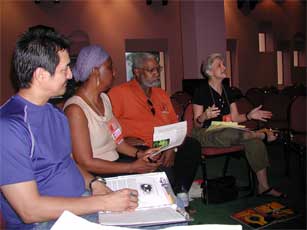
 United States Left and United States Social Forums (January 29, 2006)
United States Left and United States Social Forums (January 29, 2006)
Marc Becker
marc@yachana.org
On Sunday morning in the last time slot of the 2006 WSF, a small group of activists gathered in the Caracas Hilton to discuss how to advance the struggle for social justice in the United States. While this struggle has taken various shapes, organizing social forums has become one of the most significant and empowering expressions. Bringing a model of mobilizing civil society from the south to the heart of the empire and the process of organizing and holding a social forum is a fundamentally subversive and profoundly radical activity, but it is precisely this attempt to dismantle capitalism that makes it so hard to organize such a forum in the United States. The panel intended to provide an arena for discussion of how to advance the agenda of social forums in the United States, and the U.S. left in general.
Michael León Guerrero from the United States Social Forum (USSF) began the discussion with reflections on why we have difficulties in reaching the same scale of the WSF in the United States. The U.S. is the most disconnected from global dialogues. We need to get involved in these discussions. The United States Social Forum is tentatively planned for Juneteenth (June 19th) 2007 in Atlanta. The USSF has adapted a structure that mirrors that of the WSF.
Rose Brewer from the organizing committee of the Midwest Social Forum (MWSF) recounted how this regional forum builds on Radfest’s long history as an initiative of the white left. In adopted a social forum model, the MWSF has emphasized diversity. For example, the organizing committee is comprised of a majority of women and people of color. Transforming this event into one that more fully incorporates social movements is not always easy, but ultimately promises to be fulfilling and empowering.
Suren Moodlair from the Boston Social Forum (BSF) reflected on how the nomination of John Kerry on the Democratic Party ticket in 2004 was a reflection of the importance of the BSF. Some of the main issues that Boston faces today are water and immigrant labor. There are good debates around these and other issues that happen privately, but this discourse needs to be opened up.
Walda Katz-Fishman from Project South commented on how after McCarthyism in the 1950s there has been a disconnect between the ideological left and the working class. We come out of a tradition of unity of theory and practice, she argued, but we need more deep structural analysis and a building of long-term strategies, consciousness, and vision. Popular education is one of the best way to achieve these goals. Others in the audience echoed the importance of her emphasis on the importance of education.
Jerome Scott also from Project South noted how social movements tend to ebb and flow. At this moment, we are breaking out of an ebb. To be successful, Jerome argued, it has to be huge. To achieve this we need leaders with skills that will assure the movement goes in the right direction. The South has been the historical center of struggle in the United States, and once again will play that role. Hurricane Katrina uncovered a lot of issues, and people are thinking about class and race in ways that they have not before.
Thomas Ponniah from NIGD concluded these brief opening comments with the observation that while it was an important structural decision to hold the WSF in the south, the forum is still weak in maintaining gender inclusiveness. A majority of the forum’s participants are women, but the majority of presenters are men; they are seen as the ones who create knowledge. What will the WSF do to assure more participatory democracy in terms of gender balance? Thomas proposed that 50 percent of presenters on panels should be women. A second issue is that currently the biggest opponent of imperialism is Venezuela, and acting in solidarity with Venezuela is one of the most important issues facing us today.
After these opening reflections, we asked the audience to comment on what they felt was the most important thing to do to engage imperialism and to build social forum processes in the United States. Much of the discussion revolved around putting ideas of participatory democracy into practice, building alliances to overcome problems of isolation and fragmentation, and emphasizing the importance of popular education that Walda had stressed during her opening comments.
Many people noted a need for concrete ideas in order to advance social movements in the United States, but as a whole participants were weak and vague on such specific ideas and how they would be carried out. Perhaps because the meeting was scheduled in the final time slot when many participants were already leaving, only half of the presenters who had agreed to start the discussion showed up. Generally the energy level was also rather low, perhaps due to forum fatigue after a week of meetings. The conversation reflected not only the potential for the U.S. left but also significant barriers that we need to overcome in order to realize visions of alternative worlds in the United States.